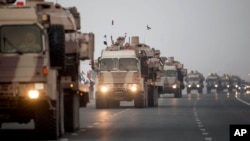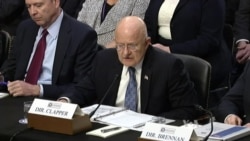Top U.S. intelligence officials appear to be raising concerns about offers by some Arab countries to put boots on the ground to fight Islamic State militants in Syria.
Both Saudi Arabia and the United Arab Emirates — Sunni-majority states uncomfortable with Iran’s expansion into Syria and Iraq — have said they could send troops.
“We appreciate and value the Saudi willingness to engage on the ground,” Director of National Intelligence James Clapper told lawmakers Tuesday, adding, “I think that would be a challenge for them if they were to try to take that on.”
Watch: National Intelligence Director James Clapper briefing lawmakers.
Clapper praised UAE’s counterterrorism forces on their performance in Yemen, calling it “quite impressive.”
But Defense Intelligence Agency Director Lieutenant General Vincent Stewart said an additional deployment might be too much of an undertaking.
“Whether they have the capacity to do both Yemen and something in Iraq-Syria is questionable,” he said. “They’re doing extremely well in Yemen, but the capacity to do more is pretty limited.”
Different objectives
The Soufan Group, which provides strategic security intelligence services to governments and the private sector, warned that the differing objectives of those countries would further complicate an already complex battlefield.
“If for Turkey the conflict is mainly about [Syrian President Bashar al-] Assad and the Kurds, then for Saudi Arabia it is mainly about Iran, and for the UAE it is mainly about its relationship with Saudi Arabia and the United States,” Soufan said.
“These competing or overlapping interests will test the coalition as it contemplates its next steps,” it said.
But the Turkey-Saudi-Qatar front could provide an important counterweight to the Russian- and Iranian-backed Syrian government partnership that appears to have eschewed a political solution for a military one.
“Turkey, Saudi and Qatar will likely decide that the way to get everyone back to the negotiating table is to raise the cost of the military campaign for the government side,” said Omar Lamrani, military analyst for Stratfor.
“So they could likely bolster the rebels by military and financial means, basically giving them cash to pay their soldiers and supply them, and militarily by giving them weapons,” Lamrani told VOA.
“They want to maintain a stake in the conflict and bring the U.S. closer to their positions," he said. "Saudi Arabia and Turkey understand that with Russia involved, it is all the more important that the U.S. remain close to them.”







